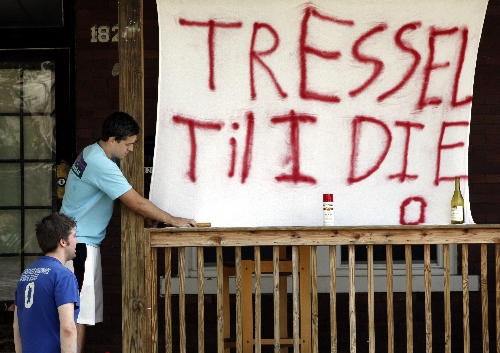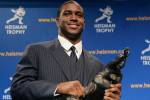Tattoo scandal leads embattled Ohio State coach to quit post
COLUMBUS, Ohio -- At the bottom of the stunning resignation letter that he carefully typed in his office on Monday, in the last lines above his characteristically neat and clear signature, Ohio State coach Jim Tressel closed with a personal note.
"We know that God has a plan for us and we will be fine," he wrote, referring to himself and his wife, Ellen.
"We will be Buckeyes forever."
But no longer will he be the Buckeyes coach.
Tressel, who guided Ohio State to its first national title in 34 years, resigned Monday amid NCAA violations from a tattoo-parlor scandal that sullied the image of one of the country's top football programs.
He said the ongoing investigations and drumbeat of almost daily, sordid revelations were a "distraction" to the university and that he was stepping down "for the greater good of our school."
Tressel is still scheduled to go before the NCAA's committee on infractions in August for lying to the NCAA and then covering it up -- the most egregious of sins for a coach in the eyes of college sports' ruling body. The former coach will join school officials at that meeting.
But Ohio State is not required to pay any buyout or severance to Tressel, who made around $3.5 million a year.
Ohio State announced that assistant coach Luke Fickell, already tabbed to take over for Tressel during his self-imposed five-game suspension for his violations, will be the Buckeyes coach for the 2011 season. Ohio State will begin looking for a permanent coach who will take over next year.
It was a startling fall for a coach who won championships and sidestepped several major NCAA violations through the years. They dated to his days as the successful coach at Youngstown State, where he won four Division I-AA national titles, through a decade as Ohio State's coach, where he posted a 106-22 record.
The abrupt resignation capped six months of turmoil in the program.
In December, five Ohio State players -- including star quarterback Terrelle Pryor -- were found to have received cash and discounted tattoos from the owner of a local tattoo parlor who was the subject of a federal drug-trafficking case. All were permitted by the NCAA to play in the Buckeyes' 31-26 victory over Arkansas in the Sugar Bowl, with their suspensions to begin with the first game of the 2011 season.
After the team returned from New Orleans, Ohio State officials began preparing an appeal of the players' sanctions. It was then that investigators found that Tressel had learned in April 2010 about the players' involvement with the parlor owner, Edward Rife.
A local attorney and former Ohio State walk-on player, Christopher Cicero, had sent Tressel emails detailing the improper benefits. Tressel and Cicero traded a dozen emails on the subject.
Tressel had signed an NCAA compliance form in September saying he had no knowledge of any wrongdoing by athletes. His contract, in addition to NCAA rules, specified that he had to tell his superiors or compliance department about any potential NCAA rules violations. Yet he did not tell anyone, except to forward emails to Ted Sarniak, reportedly a "mentor" for Pryor in his hometown of Jeannette, Pa.
Also Monday, The Columbus Dispatch reported that Pryor is the subject of a "significant" inquiry by the NCAA and Ohio State regarding cars and other improper benefits he may have received.
Later Monday, Sports Illustrated reported that the memorabilia-for-tattoos violations actually stretched back to 2002, Tressel's second season at Ohio State, and involved at least 28 players -- 22 more than the university has acknowledged. Those numbers include, beyond the six suspended players, an additional nine current players as well as other former players whose alleged wrongdoing might fall within the NCAA's four-year statute of limitations on violations.
After the article's release, athletic director Gene Smith issued a statement.
"During the course of an investigation, the university and the NCAA work jointly to review any new allegations that come to light, and will continue to do so until the conclusion of the investigation," he said.
Ohio State called a hurried news conference March 8, during which it handed Tressel a two-game suspension (later raised to five games), fined him $250,000, and required him to publicly apologize and attend an NCAA compliance seminar.
Smith and Ohio State President Gordon Gee, though, heaped praise on Tressel and said they were behind him 100 percent. Gee even joked when asked if he had considered firing the coach: "No, are you kidding? Let me just be very clear: I'm just hopeful the coach doesn't dismiss me."
Tressel's downfall came with public and media pressure mounting.
Smith said in a video statement Monday, "As you all know, we are under NCAA investigation. We will not discuss any of the matters around that case or any further accusations that may emerge. We will do what we always do. We respond to them, we collaborate with the NCAA and try and find the truth."
Ohio State will go before the NCAA's infractions committee Aug. 12.
As for Tressel, he was in trouble with the NCAA, even before coming to Ohio State. In fact, he was the coach at Youngstown State when it received scholarship and recruiting restrictions for violations involving star quarterback Ray Isaac.
Before that investigation had played itself out, Tressel was hired in 2001 at OSU.
Introduced as coach at an Ohio State basketball game in 2001, Tressel vowed that fans would "be proud of our young people, in the classroom, in the community, and most especially in 310 days in Ann Arbor, Mich., on the football field."
His first team went just 7-5, but the unranked Buckeyes shocked No. 11 Michigan 26-20. Tressel would go 9-1 against Ohio State's archrival and 6-4 in bowl games.
In 2002, with a team led by freshman tailback Maurice Clarett, the Buckeyes won everything. They went 14-0, winning seven games by seven or fewer points. Ranked No. 2, they took on top-ranked Miami in the Fiesta Bowl for the Bowl Championship Series national title. In the second overtime, Clarett bulled over the middle for a touchdown and the Buckeyes held on to clinch their first national title since 1968.
The following summer, Clarett reported that a used car he had borrowed from a local dealer was broken into and that he had lost thousands of dollars in the theft. Clarett's call to police came from Tressel's office. Clarett admitted he had made up the break-in call and later took a plea deal. But the NCAA began looking into Clarett and the team. Soon after, he was declared ineligible. He would never play another college game.
A COACH'S DOWNFALL
Five Ohio State players are found in December to have received cash and discounted tattoos from the owner of a Columbus, Ohio, tattoo parlor who was the subject of a federal drug-trafficking case.
During the investigation, it is discovered that Tressel had learned in April 2010 about the players' involvement with the parlor owner, Edward Rife.
Tressel exchanges a dozen emails with a local attorney detailing the improper benefits.
In September, Tressel signs an NCAA compliance form that stated he had no knowledge of any wrongdoing by athletes.
The Columbus Dispatch reports quarterback Terrelle Pryor is the subject of an inquiry by the NCAA and Ohio State regarding cars and other improper benefits he may have received.
Tressel resigns as coach Monday




























